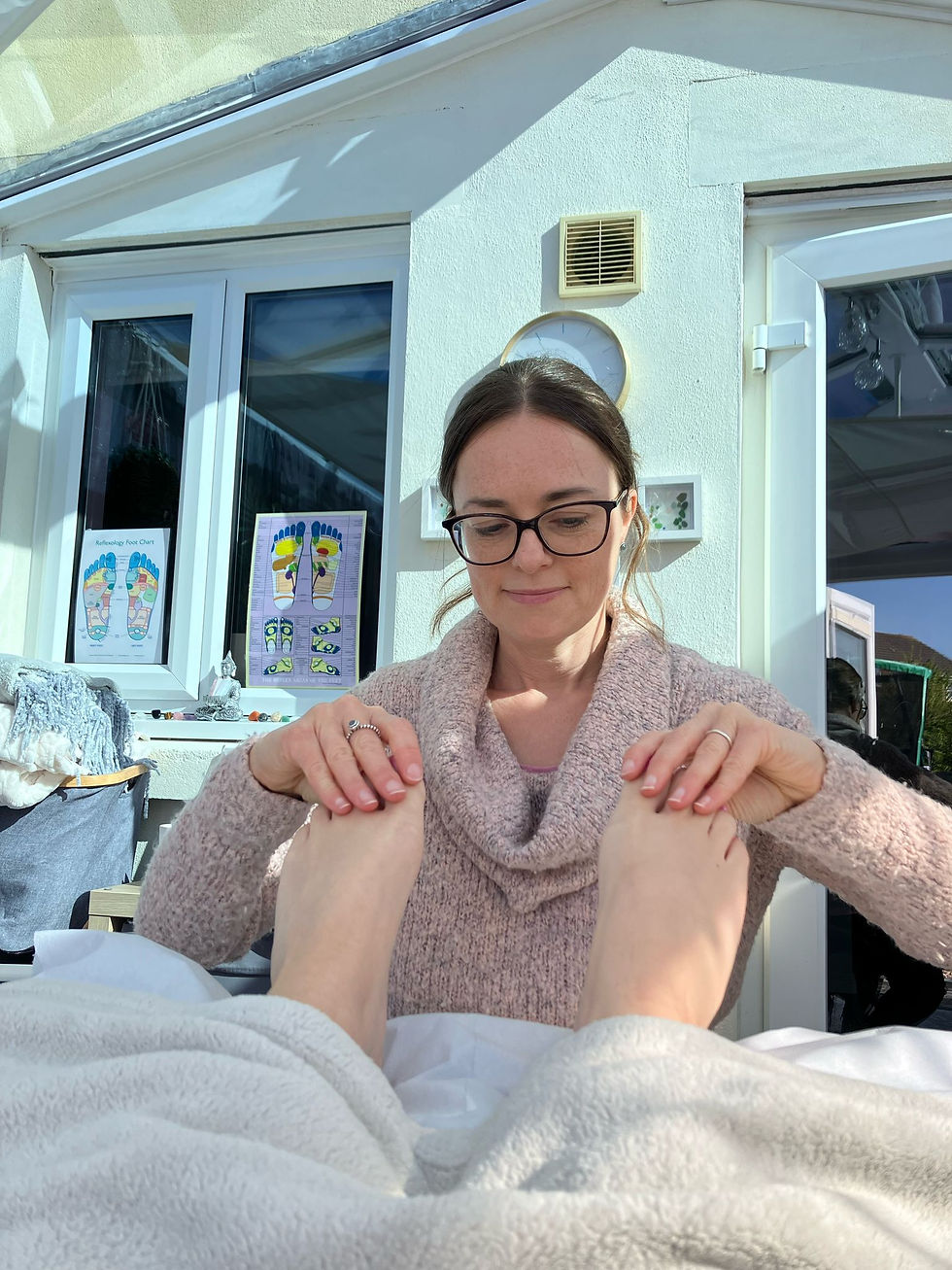top of page











Mindful Reflexology
Mindful Reflexology is my latest offering of advanced Reflexology techniques, including bespoke lifestyle suggestions so I can help you manage and cope better with emotional wellbeing, stress, anxiety and depression. It will be able to help you "get out of your head and into your body".
What is stress?
Stress is physiological reaction that happens when demand outstrips resources. The body reacts to undue pressure, which in the short term can cause increased blood pressure, heart rate, breathing and sweating. While the body is designed to cope with short bursts of the stress response, in the longer term this reaction can be damaging to many bodily systems such as the cardiovascular, muscularskeletal, immune, reproductive and digestive systems manifesting in issues such as heart problems, high blood pressure, pain, frequent infections and irritable syndrome. Stress also manifests in psychological problems such as low mood, anxiety and depression. Whilst is not always possible to change a stressful situation, there are ways we can cope better. We can do things to switch off from the stress, to relax and encourage the body to not be in a state of flight or fight anymore but rest and digest. We need to acknowledge that the way we live has a profound impact on our health and wellbeing.
Self-care:
Whilst it is not always possible to change a stressful situation, there are ways in which we can learn to cope better and feel better. Self-care is " the practice of taking action to preserve and improve ones own health. It is not a luxury, it is a vital practice for wellbeing and when you make this an every day habit, you discover it is not an extravagance or a distraction. It is a caring way to build a positive self image, self acceptance and build resilience. This in turn, empowers you to make healthier choices, set boundaries and prioritise your own well-being.
"Your mental health is a priority. Your happiness is essential. Your self-care is a necessity." - Sally Earlam
Stress busting activities:
*Making time for regular complimentary therapies such as Reflexology which creates a relaxed, restful and rebalancing session.
*Regular exercise - will release your natural feel good hormones, lifting your mood, distraction from worries and helping to reduce fatigue.
*Eating healthy fruits and vegetables to ensure you get all the nutrients, vitamins and minerals needed. When we are stressed we often crave sugary foods or caffeine to keep us going.
*Reducing alcohol - whilst drinking can help you feel more relaxed, excessive consumption can lead to feelings of depression and anxiety.
*Reducing caffeine - as this increases the production of cortisol the stress hormone. Try cutting back on foods and drinks containing tea, coffee, fizzy drinks and chocolate.
*Getting plenty of sleep- as our bodies need time to rest and recharge.
*Do something creative - will help you to relax and take your mind off things.
*Journaling - writing down things you are grateful for can help you see the positives in life rather than the negatives.
*Socialise with family, friends or colleagues - making connections can help you feel less isolated and sharing your mental load can often be a release.
*Reducing smoking - as it can heighten the feelings of stress with the body craving nicotene.
*Reducing screen time - artificial light can make it harder for the brain to switch off .
*Meditation and Mindfulness - can calm the mind anytime of day. Mindfulness aims to relax the mind to promote a non-judgemental awareness of not only our thoughts but also feelings and sensations.
Some research articles:
1.A research study found that Reflexology profoundly reduced the state of anxiety. The reduction was consistent with an 'increased feeling of ease and a reduction in anxiety'.
AJ Mc Vicar et al. Evaluation of anxiety, salivary cortisol and melatonin secretion following a reflexology treatment; a pilot study in healthy individuals. Complimentary therapies in clinical practice, (2007), Vol 13; Number 3.
2.Research shows that a consistent meditation practice reprograms neural pathways in the brain, and therefore, improves our ability to regulate emotions.
https://www.ncbi.nlm.nih.gov/pmc/articles/PMC1361002/
3.A study published combining data from 47 clinical trials found a significant improvement in both anxiety and depression similar to the effect that is found with taking anti-depressants.
JAMA; Internal Medicine, on-line January 6, (2004)
4.Foot reflexology was found to have a positive effect in lowering the total anxiety scores of the pregnant women. Reflexology is a noninvasive and economical method, which may be used by health professionals to reduce problems during labour. A decrease in anxiety experienced at birth improves women's positive birth experiences, promotes a secure mother-infant attachment, and protects postpartum mental health.
Yilar Erkek Zumurit; Aktas Songul; J Altern, Complement Med (2018) 24.
5. Foot reflexology massage is an efficient and safe intervention for alleviating psychological responses among older people suffering acute coronary syndrome during hospitalisation.
The effect of foot reflexology on hospital anxiety abd depression in older s: a randomized control trial. Bahrami Tahereh; Rejeh Nahid et al, International journal of Massage Bodywork (2019) 12










bottom of page